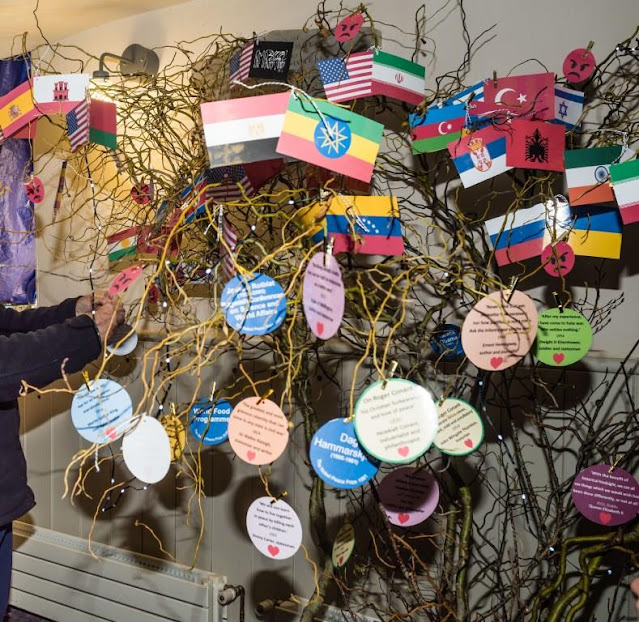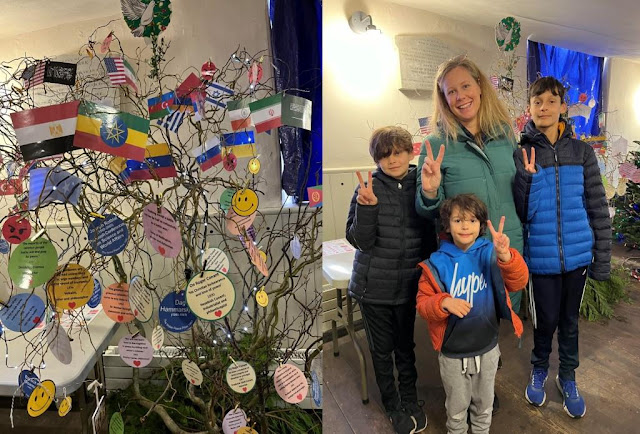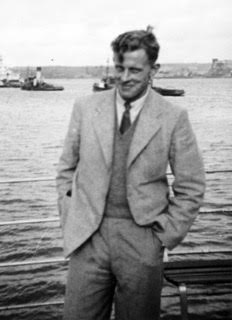AROUND THE TOWN AND OVER THE POND - 11: PACIFIST FANTASIES MEET 'COLONIAL ASSOCIATIONS' AND 'A FEAR OF THE PAST'
Continued from
https://budleighpastandpresent.blogspot.com/2024/06/around-town-and-over-pond-10-american.html
AROUND THE TOWN AND OVER THE POND
A walk around Budleigh Salterton to interest transatlantic visitors. Every so often there’s a diversion which may inspire you to visit places like East Budleigh, Exeter, Sidmouth, Colyton or even places in the United States and Canada.
The walk is set out in parts. Here’s the eleventh part:
Still at the Raleigh Wall.
11. PACIFIST FANTASIES MEET 'COLONIAL ASSOCIATIONS' AND 'A FEAR OF THE PAST'
I was moved by the seemingly pacific character of Roger Conant. It seems to stand out in such stark contrast with some of his brutal contemporaries, and I felt that this peace loving Devonian deserved to be better known in his homeland. Could he even become a pacifist icon?
Not only had he intervened to avoid bloodshed in 1625, but he had cooperated in the peaceful transfer of power to Governor John Endecott. And then in his later years, as we read on the blue plaque in East Budleigh, he petitioned for Beverly to be renamed Budleigh but accepted without question the decision of the magistrates of the General Court in Boston.
In St Andrew’s Church, Colyton, where Roger’s grandparents John and Anne Clarke and perhaps even Roger himself had worshipped, I’d noticed during a visit in 2022 a kind of Peace Chapel where a Prayer for Ukraine, composed by the Archbishops of Canterbury and York, was on display. It was accompanied by another prayer on the same theme by the Rev. Dr Sam Wells, Vicar of St Martin-in-the-Fields, London. The colours of Ukraine’s blue and yellow flag were displayed next to it.
I saw that the same Chapel also displayed the blue and red colours of the Russian Federation’s flag.
Exeter Cathedral. Image credit: WyrdLight.com
Two years later, in 2024, I found Exeter Cathedral inviting families to book spaces on its Make Your Own Delft Dove of Peace Workshops, using patterns traditionally used in Dutch Delftware.
Advertising
the 2023 Christmas Tree Festival at Salem Chapel
For many years, at Salem Chapel in Roger Conant’s birthplace of East Budleigh, a major winter attraction has been a Christmas Tree Festival.
The first Festival proved so popular that the tradition grew rapidly, progressing from around a dozen trees to over 50 in 2016.
Salem Chapel, incidentally, has no connection with the
city that Conant founded. ‘Salem’, from the Hebrew word ‘shalom’, simply means
‘Peace’, similar to the Arabic greeting ‘salamun alaykum’ that means ‘Peace be
upon you.’ There are Salem Chapels in various countries of the world.
Along with 20 or so other
organisations in the East Budleigh area the Roger Conant Club, was invited to
participate and decided to contribute a Christmas Peace Tree in view of Roger’s
reputation as a peace maker.
To decorate the tree, pairs of flags represented those nations which do not have as happy a relationship with each other as they might. Lower down, the decorations echoed the theme of peace, including names of recipients of the Nobel Peace Prize.
‘Baubles’ were inscribed with anti-war quotations from well known or interesting figures from over the centuries, even including East Budleigh’s own Sir Walter Raleigh. I discovered only recently that he tried to act as a peace maker between England and Spain just before the launch of the Spanish Armada.
A dove, made by our local artist John Washington, perched uneasily over the whole thing. After its few days in Salem Chapel the Peace Tree was transferred to All Saints Church in East Budleigh in time for the Christmas services.
The Peace Tree could have been a school project. Perhaps a few of the young visitors to East Budleigh’s Christmas Tree Festival or children in All Saints Church will have remembered that odd-looking Christmas tree.
They may have recognised names of Nobel Peace Prize winners on the blue baubles.
Photo by Richard Allen
Some
of them may have entered the art contest to design a Peace Poster organised by
Lions International. In 2023 it was a 12-year-old member of Budleigh Salterton
Adventure Group, Thomas Franklin, whose poster was chosen as the winning entry
by the town’s Lions Club.
To quote from the Lions Clubs' website: 'For over three decades, Lions Clubs around the globe have been sponsoring a very special art contest in schools and youth groups. Creating peace posters gives children everywhere the chance to express their visions of peace and inspire the world through art and creativity.'
Image credit: Clément Morin; www.nobelprizemuseum.se
Some of their teachers may even have attended the Nobel Prize Teacher Summit, pictured above. At this event, since 2017, ‘teachers from all over the world meet Nobel Prize Laureates, top scientists and peace activists around a theme of great importance in education.’
Perhaps a Devon student might one day edit a peace-themed magazine.
David Loyn. Image credit: Imperial
War Museum. Andrew North Image credit:
www.linkedin.com
They might interview journalists such as David Loyn or Andrew North, renowned for their work in conflict zones.
Image credit: Wikipedia
They might feature peace activists from the past like (clockwise from top left): Albert Schweitzer, Henriette Beenfeldt, Coretta Scott King and Bertrand Russell.
Image credit: Wikipedia
Or even interview activists of today such as (clockwise from top left): Milan Rai, editor of the UK-based Peace News, musician Roger Waters, singer-songwriter Yoko Ono and basketball player Malebogo Molefhe.
Composer Michael Berkeley, also known as The Right Honourable The Lord Berkeley of Knighton CBE Image credit: Wikipedia
A student with an interest in classical music could feature an anti-war work like the oratorio Or Shall We Die?, first performed in 1983. It was commissioned by the London Symphony Orchestra Chorus from novelist Ian McEwan and composer Michael Berkeley, who would be happy to be interviewed.
‘For more than thirty years we have been in a position unprecedented in our history to destroy ourselves as a species,’ they explain. ‘There are now more than sixty thousand nuclear warheads primed and programmed for their destinations, and each year more sophisticated systems are planned and deployed. One may search the history books in vain for a time when nations armed for war and none had happened. For all the complexities of nuclear strategy, the situation has about it the aspect of very simple human folly: each side arms for war because it sees the other doing the same.’
They might decide to feature Peace memorials, some better known than others.
The Duke of Windsor, formerly King Edward VIII, and his wife meet Hitler during their 1937 tour of Germany. Image credit: Wikipedia
They might ask awkward questions such as: ‘Was Edward VIII a peacemaker?’, ‘Do cultural boycotts work?’, ‘Should Exeter City Council have detwinned its Russian twin?’, ‘Should NATO never have been formed without Russia as an early member?’, ‘Would there be fewer wars if women ran the world?’
Top: Bradford Peace Museum, UK; The Atomic Bomb Museum, Nagasaki, Japan. Image credit: www.creativetourist.com and www.visit-kyushu.com
The student might go on to found a Peace Museum, like the one in Nagasaki which ‘educates the public about the horrors of war and the importance of striving for peace’. It would be a museum which would stage exhibitions about artists and authors who might be described as pacifist.
The ‘Guernica’ tapestry at the
United Nations building, New York. Artist Pablo Picasso in 1962. Image credit: www.un.org and Wikipedia
People like Banksy, Vera Brittain, Jacob Epstein, Erasmus, E.M. Forster, Goya, Aldous Huxley, Henry Moore, George Orwell, Picasso, Jonathan Swift, Voltaire. And so many more.
Such a student might even win a Roger Conant Peace Prize.
Sadly, that seems unlikely. It seems that schools are among the institutions throughout the country which claim to be ‘revaluating their associations with the colonial past’ and would have reservations about using the Conant name. Simply because one member of the Conant family crossed the ocean in search of a better life.
Arms of Exeter School and The King’s School, Ottery St Mary showing
the years in which they were founded
Other names have become a cause for concern among teachers, including at Devon schools. While The King’s School in Ottery St Mary is keeping the name of Raleigh for one of its four school houses, Exeter School announced in March 2024 that it would be removing the names of Sir Francis Drake and Sir Walter Raleigh.
The decision, it claimed, was ‘not an attempt to change or eradicate our history’ but, in the words of a local news item, ‘formed part of a structural switch-up in the school's housing system’. Whatever that means.
Image credit: Wikipedia
According to the news item, Exeter School apparently admitted that the initial discussion on removing the names took place when ‘statues of historical figures were being toppled’. The most notable toppling was that of June 2020 in Bristol, when the statue of Edward Colson, just visible in the above photo, was dumped into the city harbour.
Perhaps the powers-that-be at Exeter School had come across this denunciation of Raleigh by an Exmouth lady called Elizabeth. ‘Should East Devon be planning an event to mark the 400th anniversary of the death of its local hero Sir Walter Raleigh?’ was the question asked on social media in the run-up to 2018?
The brutal reality of the slave trade: A plan of the British slave ship Brookes, showing how 454 slaves were accommodated on board after the Slave Trade Act 1788. This same ship had reportedly carried as many as 609 slaves and was 267 tons burden, making 2.3 slaves per ton. Published by the Society for Effecting the Abolition of the Slave Trade. Image credit: Wikipedia
This was Elizabeth’s very definite answer: ‘Celebrate Walter Raleigh no chance he made his money from the slave trade along with Elizabeth a disgrace nothing to celebrate there along with the mayflower ship leaving from Plymouth a boat load of poor innocent men, woman and children set voyage for a disgusting life chained up whipped and beaten and rape defo no and to work day and night poor slaves. America made great through the slaves along with Britain.’
Admittedly we’re talking social media.
Raleigh had been dead for two years when the Mayflower set sail for America with the Plymouth Pilgrims.
Devon
Churchland website; All Saints Church, East Budleigh. Image credit: Peter
Bowler
But not so long ago you could read in the East Budleigh section for All
Saints Church on the truly excellent and scholarly Devon Churchland website
that the Raleigh family’s most famous son is ‘Sir Walter Raleigh, one
of the first English colonisers of North America (along with being an early
slave trader, a desperate nightmare to partake in).’
At least they were quick to amend the statement when asked what evidence there was for it.
Image credit: www.downtownraleigh.org
Across the Atlantic, in the American state which has such
close associations with Raleigh, there is a call to remove his statue in the
city named after him. In 2020 a petition was launched on the internet platform
Change.org
‘The name Sir Raleigh Walter brands our city with a stained legacy,’ it claimed. ‘A legacy we cannot afford. While even today the City of Raleigh only offers what is Affordable to those whom they actually owe vs. stopping their Post Colonial War on the Poor. The heirs to his conquest have tripled in wealth and expanded while the victims of enslavement are pushed out, forced out, shut out and even incarcerated.’
The Orangery, Bicton Gardens. Image credit: www.geograph.org.uk
Incidentally, during a visit to Bicton Gardens I made a point of looking at the façade of the Orangery. It includes three niches to honour Lord Nelson, the Duke of Wellington and Sir Walter Raleigh, the first two containing white marble busts on fluted columnular pedestals. But of the bust of Raleigh there was no sign.
Bob Newhart at the 1987 Emmy Awards. Image credit: Wikipedia
‘Nutty Walt’ by Mike Tingle. Image credit: www.brookgallery.co.uk
Whatever we learn about Queen Elizabeth I’s favourite there
will always be those who think of him as ‘nutty Walter’ immortalised by
American comedian Bob Newhart in ‘Introducing Tobacco to Civilization’. It’s a famous sketch based on Raleigh’s phone
conversation with the head of ‘The West Indies Company in England’. He thinks it unlikely that people will want to
stick burning leaves in their mouths’.
Many people think of Raleigh as ‘just as a pirate who lost his head’.
A well attended Elizabethan Evening was held in East Budleigh
Village Hall on Saturday 18 May 2024 to honour the Raleigh and Conant families.
Perhaps you think that many characters from the past should be airbrushed from the history that we teach in schools. That their names and the names of their families should be forgotten. Whatever you think about them, Roger Conant’s life makes a good story. I wrote some verses about him:
The Salter’s Song
In sixteen hundred and twenty-three,
A yeoman’s son from
East Budleigh
Did wish his family
‘Au revoir!
I’m off to find
America.’
In London town he’d learnt his trade:
As salter he had made
the grade.
Now Roger Conant was
his name;
We think he needs a
bit more fame.
His wife called Sarah
joined the ship
With baby Caleb on
the trip.
They sailed across
the ocean deep.
I don’t suppose they
had much sleep.
And finally at
Plymouth Bay,
Where previous
Pilgrims showed the way,
The Conant family
came ashore.
The year was sixteen
twenty-four.
Now Roger’s skill was
salting fish
To make a decent kind
of dish.
For just in case you
have forgotten,
No fridges meant your
food went rotten.
Just north of
Plymouth is Cape Ann.
West Country
merchants had a plan
To make the Cape a
fishing port
And maybe even build
a fort.
And Roger was named
supervisor.
They said of him
‘There is none wiser!’
It was of course a
job promotion,
With splendid outlook
on the ocean.
A major problem did
occur,
For Plymouth’s
Pilgrims furious were.
Their Captain
Standish did arrive.
The year was sixteen
twenty-five.
This man was noted
for his ire.
‘Be gone!’ he said. ‘I’ll open fire!
That fishing stage is
ours by right.
We will not hesitate
to fight!’
The fishermen denied
access.
It could have been a
bloody mess.
But hero Roger saved
the day.
His words of peace
made all ok.
Conciliation, then
and now,
Is always better than
a row.
Diplomacy, a path to
peace,
Will cause all stupid
wars to cease.
In Massachusetts he’s
renowned,
For this East
Budleigh man did found
A city where his
statue’s fame
Does almost match the
city’s name.
It’s also known, I’ve
heard it said,
And in biographies
I’ve read,
That Roger Conant’s
peaceful vibe
Impressed the
Massachusett tribe.
So Roger Conant,
worthy chap,
Deserves, we feel, a
special clap.
These verses do
indeed attest:
‘Peacemakers are most surely blest.’
Now, finally, let’s move on from the Raleigh Wall to
Fairlynch Museum!


































Comments
Post a Comment